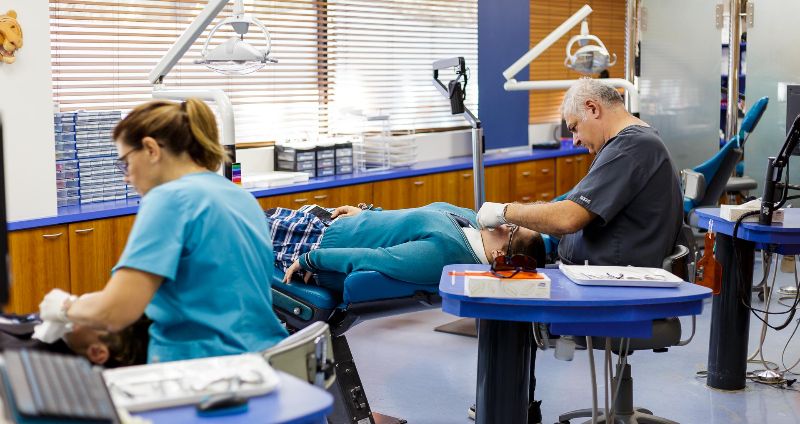Dentists routinely recommend orthodontic treatment to their patients, particularly young patients whom they know are facing a lifetime of oral or even general health concerns. Most dentists will refer their patients to a qualified orthodontist, but some will offer to complete the treatment themselves. Due to the established relationship and trust, patients will sometimes proceed with treatment before gaining a second opinion. However, what patients do not realize is there are differences between an orthodontist and a dentist.
Years of Training
All orthodontists are qualified dentists and hold a degree in dentistry. Most dentists will leave university and go into general practice to work. A small number of dentists decide to specialize in orthodontics. They must complete at least two years in general dental practice prior to an additional three years of study in an accredited university to qualify as a specialist. General dentists may complete weekend-long courses in one type of treatment or extended short courses over a year or two part-time whilst they are working in their general dental practice, but they cannot be considered registered specialists or use the term “orthodontist” to offer any orthodontic treatments.
Experience of an Orthodontist
While a dentist is completing a wide range of important roles including preventive dentistry, fillings, crowns, examinations, and root canals they are not exclusively working with patients requiring orthodontic treatment. The orthodontist practices orthodontics exclusively and all treatments including continuing education are focused on orthodontics specifically. It is difficult enough for specialist orthodontists to keep pace with developments in their own field so we rely on the general dentist to deliver the most up-to-date practices associated with general dentistry.
The Results from Using an Orthodontist
When you are investing money and hours of your time in orthodontic treatment, you should expect to be seen by a professional in the field. Attending an orthodontic clinic also gives you peace of mind that you are going to be happy with the final result. You are going to live with your new-look smile for the rest of your life. You need to rely on your orthodontist to know when your treatment has achieved the desired result, both medically and aesthetically, whatever the motivation for treatment.
Your Dentist is Part of the Team
After treatment begins with a qualified orthodontist, you will still see your dentist. Your orthodontist will see you regularly to check on the movement of your teeth. You will still need to attend regular appointments with your dentist to have your teeth cleaned and examined for decay.
Some patients require extractions before braces are fitted. In most cases, they are referred back to their dentist. In case of an impacted tooth, the referral may be made to see an oral surgeon. The role of the general dentist in supporting the orthodontist during the course of treatment and this teamwork cannot be understated and is truly appreciated as a key team member in achieving excellent outcomes for all of our patients.
When to See an Orthodontist
An orthodontist rather than a dentist can best handle the following scenarios.
- Crooked Teeth
- Closing the gaps between teeth
- Aligning the tips of teeth
- Reducing future tooth decay and gum problems
- Improving speech or chewing
- Treating an Incorrect Bite
- Decreasing the wear of teeth
Before making any decisions on something as important as orthodontics, take your time to do your research. Ensure that you are seeing a qualified orthodontist. You will be making a significant investment in time and money, so you want the best return possible on your investment.
An orthodontist will often give you more than one option for repositioning your teeth and be able to explain in detail the pros and cons of each one.
Remember that in this new age, there are so many technological advances that suggest that the quality of treatment is continuing to improve. The one overriding factor that is consistently found to improve the quality of your care is Who is providing your treatment? You can be assured that with a specialist orthodontist, you are placing your care in the very best of hands!
Ready to start your journey? Find an orthodontist near you today!
Source: https://www.theorthodontists.com.au/blog/why-use-an-orthodontist-not-a-dentist

